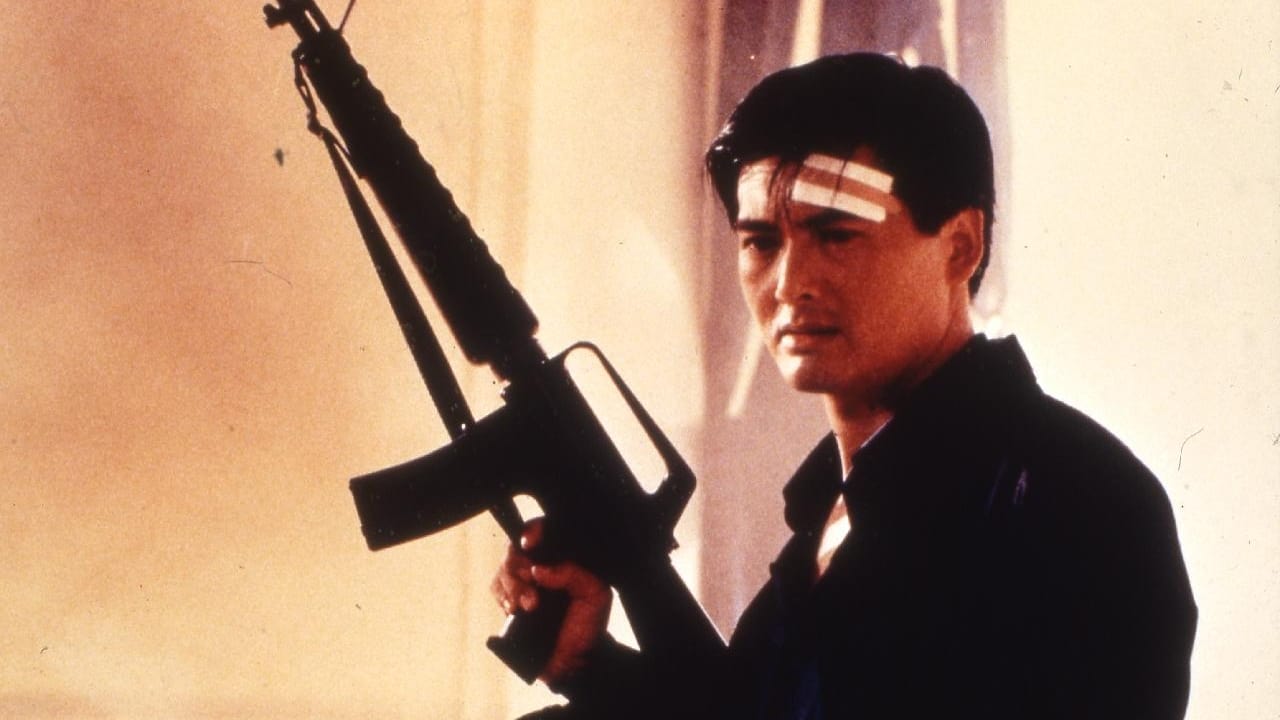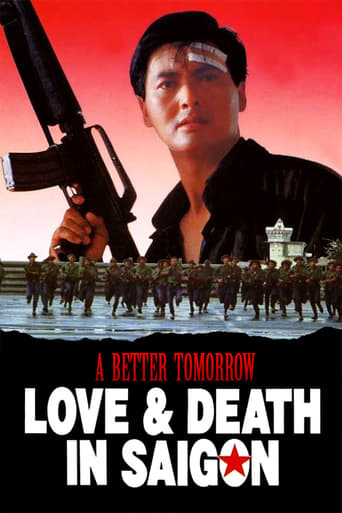SmugKitZine
Tied for the best movie I have ever seen
InformationRap
This is one of the few movies I've ever seen where the whole audience broke into spontaneous, loud applause a third of the way in.
Dirtylogy
It's funny, it's tense, it features two great performances from two actors and the director expertly creates a web of odd tension where you actually don't know what is happening for the majority of the run time.
Sameer Callahan
It really made me laugh, but for some moments I was tearing up because I could relate so much.
Anssi Vartiainen
Chow Yun-Fat reprises his iconic role as Mark Lee, the epitome of cool gangster immortalized in the first A Better Tomorrow film, directed by John Woo. This time around we get a prequel, depicting Mark's early days in the midst of the Vietnam War as he tries to rescue his uncle and cousin from amidst the horrors of war, in the process meeting a woman and learning the skills he would later use to rise to the top echelons of the Triad.It's a workable plot and definitely something anyone who has seen the original films would be interested in seeing. The problem is that they changed the director from John Woo to Tsui Hark, and unfortunately he doesn't have the skills of the master whose boots he's supposed to fill. John Woo still produced the film and you can see touches of his style in the film, but overall it feels like a cheap imitation. The action scenes lack the impact of the previous two films, the characters are not as deep or as well-defined, and the overall story lacks coherence and tension.Now, that being said, it's by no means a bad film. It still has Chow Yun-Fat playing Mark Lee, which alone makes the film worth checking out if you liked the originals. And the new characters are not bad either, with Anita Mui's Kit being an excellent female protagonist, who teaches Mark everything he would later use in his life.The film isn't as good as it could have been. The originals worked because Woo was able to insert them with such style that you could overlook the limitations of the story. Here those limitations are not as well covered and the whole film definitely creaks under its own weight. Still, it has Mark Lee in it, which makes it worth watching. Though only just.
oneguyrambling
Now this is a prequel to the first film, so rather than ABT 3 I might have suggested they call it A Better Yesterday, but I wasn't there at the time.This time Woo is out and Tsui Hark is in the director's chair, (leading to the worst film in the trilogy). Is it any wonder that Woo and Hark were once peers and that only one went on to direct internationally while the other stayed in Hong Kong making films? (In Tsui Hark's defense Woo's only real strength is action sequences, his films are otherwise no better or worse. But this IS an action film.) At two hours long this drags mightily for quite a while, and the action is over the top without the Woo benefit of being dumbly entertaining. It is like Tsui Hark said I can't promise you'll enjoy it, so I'll make it bloodier and more far fetched.A young Mark (Chow Yun Fat) goes to Vietnam in 1974 at the tail end of the Vietnam war to meet his cousin Mun as he released from prison for being involved in the black market.Mun only turned to crime to assist his ailing father to leave Vietnam and return to Hong Kong, but he got caught up in the wrong crowd and ended up in jail. So they decide to re-enter the crime world to get quick cash so that they can have another crack at leaving the country, taking Uncle/Dad with them.Now I ask you what could go wrong?Mark was only able to get through Vietnamese Customs with the assistance of an unknown woman, and she turns out to be their first contact in the Vietnamese crime underworld named Miss Chow.After their first job together goes wrong and a bloodbath ensues, Miss Chow turns into a female Rambo and blows dozens of bad guys away, and Mun and Mark acquit themselves well enough that the three of them get along like a house on fire and spend all their time together.Now that they have the cash to leave Vietnam they sell up and head off, again nothing goes smoothly and it is only thanks to Miss Chow that they get through, with Uncle nearly dying in the process.Back in Hong Kong a love triangle quickly forms, Mark and Mun both have the hots for Miss Chow, but she only has eyes for one of them, and it wouldn't be fair to say which here. Shortly after though the threesome becomes a foursome, with the return of Miss Chow's former boss and ex from an overseas stay.The boss immediately attempts to sever all of Miss Chow's distractions by initially trying to kill them, and then ordering them to leave Hong Kong immediately.Of course this is never going to wash, so we have a deranged finale with Mun, Mark and Miss Chow joining forces in a bloodbath that leaves dozens killed and involves tanks, machine guns, standoffs and switching allegiances. Basically everything that John Woo would have included, but in a manner so clumsy that for half the time I couldn't work out what was going on, and for the rest I didn't care.Final Rating – 5.5 / 10. A disappointing end to what was hardly an awe-inspiring trilogy to begin with. They should have stopped at two.If you liked this review (or even if you didn't) check out oneguyrambling.com
stendhalsyndrome
Sure, it's not a crowd pleaser and exactly as enjoyable on a superficial level like Woo/Hark's previous good installments... this film has something Woo never had, and that's a very good idealistic, detailed but at the same time a complex screenplay that is also opening the door for many various interpretations of the viewer as far as characters beliefs and motivations go; very long spontaneous but also intense dramatic moments led sometimes by the three characters at the very same time, brilliantly structured moody cinematography and "many" distinct characters differing one from another with their own issues interconnected throughout the story, and most of all the ability telling a story mainly only by the images and songs. Not to mention the fact that this film features much more flushy and opulent deeply profound story-line than anyone could have ever witnessed in any J.Woo film to this day! Although, one thing one could find lacking here that many fans of the first two films were affected by, which are the action sequences that this film has clearly no such interest in or simply not being as focused on as many Woo's films, though, such scenes appear here now and then if sporadically but when they show up they're coming with a sense of the unanticipation, shock and philosophical meaningness. As one biographer wrote: "In The Killer Woo shows two men firing guns, back to back, a sort of enclosed circle; Tsui Hark has the same shot in A Better Tomorrow III, except that it's Ho and Kit! Likewise, Tsui has no interest in copying Woo's "bullet ballet" style of directing action sequences; instead, Tsui emphasizes the characters and the situations. Woo directs action for the sake of the action; Tsui directs it for the sake of the story!" Why people usually prefer the first one to this much dramatically superior film was already many times explained before and one of the things very often mentioned is the element of the commercialism and the appeal well-disposed to the western tastes that was ironically and effectively sold out. This film is totally different by its Chinese aesthetics that works in a more operatic, dreamy, poetic and sometimes fully surrealistic and artistic way J.Woo could only dream of to achieve. This time the meaning of the film is not about the traditional honor, loyalty or brotherhood we've already seen in a never ending line of similar maudlin homo-erotic movies; Here we are introduced to the very meditative themes about the complexities of love and equality, and above all Tsui Hark makes a much more ambitious effort as he brings these themes to a world swallowed by chaos. In the process of portraying the relationship between the main characters, he humbles the viewers with the realization of how insignificant each one of us can be in the face of change. Yet, he does not drag us into the abyss of desperation, as he offers hope and redemption for those who keep trying. Otherwise he brings plentiful other themes resonating with the modern time, among the politics, the fear of the 97 handover and the sprawling examination of gender roles, the film's background centers on the celebration of the Chinese nationality by the usage of the mutual heritage in favor of all or the Chinese notion of fate circling around all the main characters, basically involving Anita Mui's meditative Kit pondering over all her doomed life that's conversely gonna reflect the life of Fat's Mark Gor later in his gangster period (previous sequels -- mind you).Each 24 or 20 frames per second are filled with an incredible ingenious sense for the timing and meaningful idea that both come along making a totally explosive impact on the mind of the viewer, either verbally or visually. The film employs a jaggy, documentary style to capture the chaos of its time; then later in more quiet moments of the film's time-frame it's creating a lovely montage of Mun, Mark and Kit shopping, using gradated filters for a dreamy, romantic feel that's bringing a sort of allegorical meaning that life continues even under the worst situations, and can also continue with joy.There's another thing that makes this timeless masterpiece different from other installments: this is one of the very few films that can never be REMADE. Possibly the best and the most provocative T.Hark movie ever! Let me say that now it doesn't quite surprise me that most of the critics were praising this film as the very best one in this classical series... they could never be more right this time.
MiB-6
"A Better Tomorrow III" is a desperate attempt to make some cash out of the legendary character Mark Gor, the three words before "III" in the title and the man they call Chow Yun Fat. It would have been somewhat more watchable if they changed this film to another chapter in the lives of Ho, Lung and Ken Gor but director Hark Tsui made the crucial mistake of making this a prequel: way back to the Vietnam war. Chow Yun Fat still makes another charismatic mark on the film but the action scenes are really terrible if you just watch this after something like Hard-Boiled. I would forgive it if it was Hollywood but, come on, this is Hong Kong! You should do better than this...But non-fans of CYF and the BT series will be pleased with the character study of Mark Gor and the off-beat romance he has with Anita Mui. It's not a complete disappointment to mainstream viewers, but to loyal Hong Kong action fans: YES.

